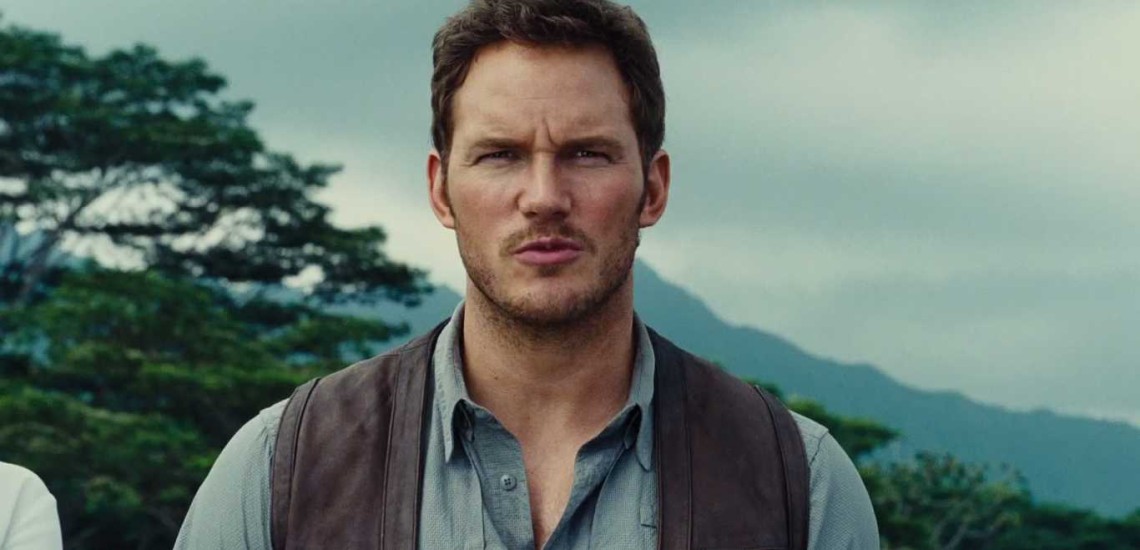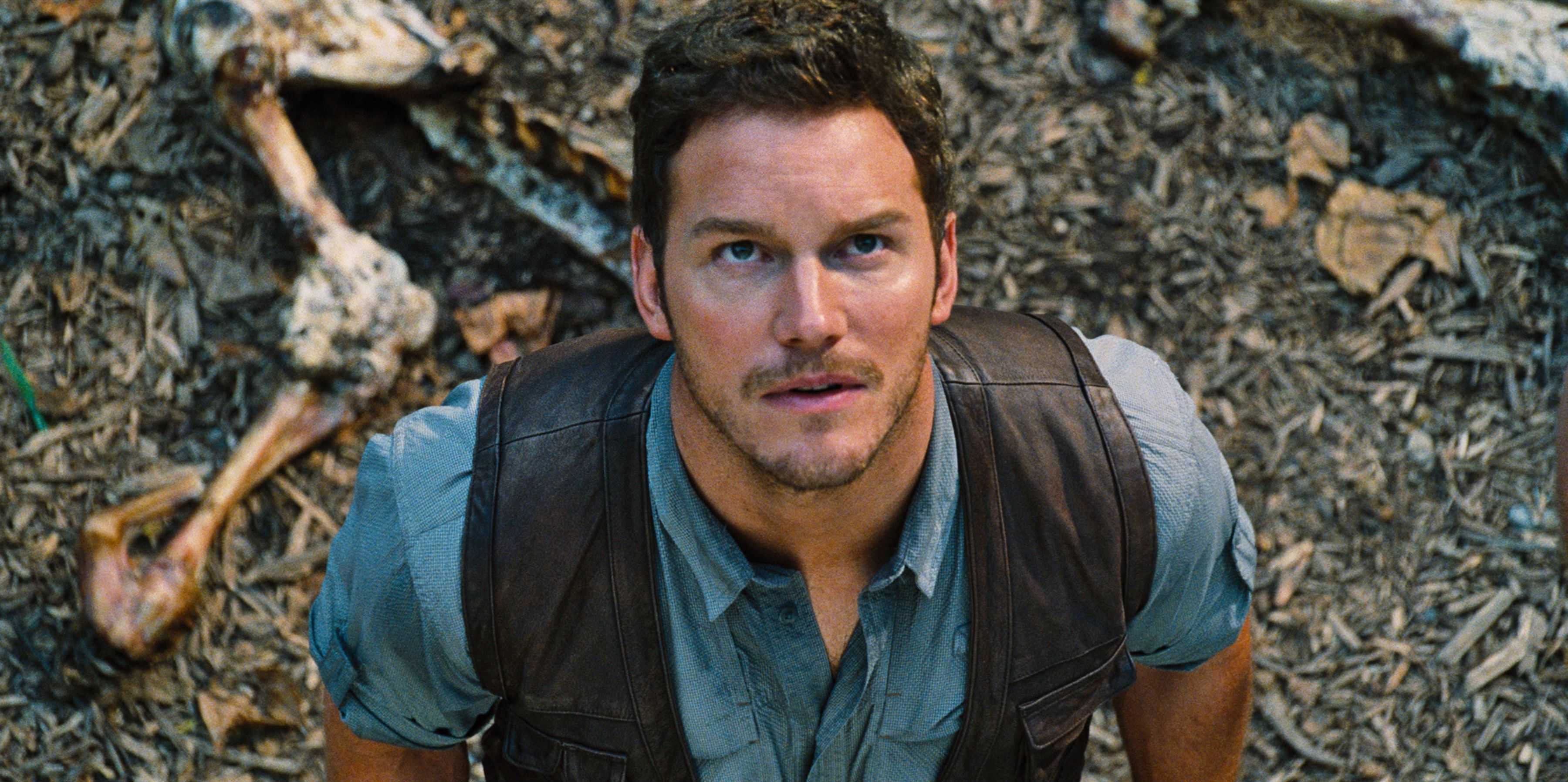In Jurassic World, Chris Pratt does battle with the Indominus Rex, a fictional dinosaur bred by way of focus groups. But the Chris Pratt we see onscreen, that digital ghost of old photographs, is himself a creation of aggregate determinism. There is, somewhere, an organic Pratt who most of us will never meet, breathing, eating, forgetting to call his mom. But the creature of his roles, his interviews, his public persona, is an Indominus Rex of not just near-unendurable levels of affability, but carefully selected, white, heteronormative domesticity. The Chris Pratt we know is not a man, but a blueprint.
Let us recall the Pratt ascendency: long-time working actor, juggling cable-TV bit parts with background film roles; lucks into megastar wife, then into multiple franchises; formerly doughy, now sculpted, yet having lost none of the “Who me?” magnetism of his dad-bod inner self, his mouth hanging forever half-cocked in an asymmetrical smile that seems to originate from the sunlit bathhouse of his own glowing soul. Unlike the anonymous physical perfection of franchise placeholders like Jai Courtney and Sam Worthington, the appeal of Pratt’s beauty is that it feels earned, as if that doughy guy who loves Cheetos is still lurking inside the now-sculpted screen idol. And it all seems so accidental, as if fame of such top-tier magnitude were as much a blunder as an accidental double entendre about fellatio on The Graham Norton Show. The fallacy of these gaffes is no secret. As Pratt told Esquire last year, “The best stuff that you hear me say will be stuff that I thought of over the past three years. The best acting I did was pretending that it was improv and sneaking it in like I just stumbled on it.” This is the key to the Pratt persona: his ability to make even his most practiced bits seem spontaneous. Pratt isn’t some caveman-browed jock of a 1980s teen movie enforcing heteronormativity through intimidation. If we ran into him on the street, he might not want to hang out with us, but he’d totally interact with us in some priceless way that confirmed our suspicion that he was the rad dude previously advertised.
In 2013, GQ called Jennifer Lawrence “The X Girl.” Approaching the height of her gif-fueled buzz cycle, Lawrence became an embodiment of a certain unknown variable, where X stood not for her franchise affiliations but for her ability to suggest near-universal relatability. You may have never met her, but you knew she’d be your buddy, the Cool Girl, unquestionably “down” for whatever. In her monumental takedown of the Cool Girl persona, Anne Helen Peterson called Lawrence, and her flibbertigibbet antecedents, “an ideal that matches the times—a mix of feminism and passivity, of confidence and femininity.” GQ reduced her to the aspects of a hermaphroditic race horse: “[t]eeth, tits, technique—and testicles…” If Lawrence’s public face embodies middle-decade, cool-girl femininity, Chris Pratt gives us the male equivalent of that X variable: what The Independent called “funny, generous, the type of guy you want to go to the pub with.”
Movie stars have always been held up as idealized versions of normativity, be it gender, political or ideological. With Pratt, here is the acceptable amount of X, where X is equal to requisite values of liberal fatherhood. Compare him to, say, Burt Reynolds, who embodied a masculine ideal of an era alternatively removed from and identical to our own. A 1975 interview by Roger Ebert describes the salad options of a chic lunch menu before demonstrating how Reynolds, real man, prefers to order meat. He could use phrases like “intellectual faggot” without fear of controversy. He played football players and bow hunters, and any time his performances were too emotional, audiences and critics were confused. All this before the Smokey and the Bandit and Cannonball Run franchises solidified his image as a prototypical, late-’70s muscle-car-driving outlaw.
Forty years later, Pratt’s interviews retain the same obsession with dead animals as equivalent to masculinity. In his GQ profile of the actor, Drew Magary gushes, “We shot guns, we grilled dead animals…we talked about strippers and compound bows…All of that is awesome. None of that is lame.” Esquire notes his “thirty- or forty-gun arsenal” and quotes his soulful anecdotes about hunting. His recent Entertainment Weekly profile notes the gun in the back of his car, part of Pratt’s preparation for his role in the upcoming Magnificent Seven remake. He is described as equal parts “tough and tender” as if he were a perfectly cooked steak. Esquire’s Anna Peele stresses how Pratt treats her as if she “were one of the elegant southern ladies…He performs these courtly gestures throughout the evening and at brunch the next morning, standing up every time I get up from or sit down at the table.”
In spirit, this obsession with firearms and manners is not too far removed from celebrity coverage of the past. Thirty-nine years old in 1940, Clark Gable, like Pratt, had settled into domestic comfort following a series of increasingly popular films; with Gone with the Wind still in theatres, he was perhaps the most famous man in Hollywood. Yet in a feature on his recent marriage to Carole Lombard, Ladies’ Home Journal praised his “passion for guns,” while Screen Guide noted his world-famous gun collection while reminding us of the genteel “yes ma’am” delivery of his early interviews, and Movie and Radio Guide’s James Street claimed bonding with Gable over their shared interest in “dogs and guns and mules.” In 1940, Gable’s life was already an amorous battleground of two failed marriages, and the Hollywood PR machine could barely keep pace. His marriage to Lombard would be over in less than two years, with two more unions to come. Pratt, then, seems to fulfill the domestic promise that so many power-couple husbands like Gable have failed to deliver. Even his son apparently bypassed the universally dreaded terrible twos and went straight into near post-natal vocalizations. He kills his own dinner and brags about his perfect son. What did you do today?
But even the public deification of a movie star’s gun collection is in service of an ideal that is specifically liberal. Compare that to how Rolling Stone described Kid Rock’s own “safe stocked with guns: a .22 rifle, two custom .45 pistols with ivory handles inside a case marked ‘American Badass Set,’ and a semiautomatic with a silencer.” If Pratt’s profiles reference hunting through vague anecdotes, Kid Rock’s includes a hunt for invasive boar on his ranch. Pratt’s gun anecdotes are couched in blue-state references to gun control, tempered by that adorable video of him French-braiding an intern’s hair during an interview. His guns, like Gable’s, are supposed to make him a man, but his politics are meant to make him acceptable, while his sensitivity is supposed to make him all but perfect. Kid Rock’s masculinity hearkens back to Burt Reynolds’s, evoking nostalgia for a time before all that political correctness got in the way of the white man’s fun. That doesn’t sell anymore. Pratt is the new paradigm, somewhere between chiseled and pudgy. Long gone are the days when movie stars considered turning down roles because they involved crying scenes, as Gable almost did with Gone with the Wind; now, Chris Pratt publicly admits that the script for his next sci-fi sequel almost made him cry. And Pratt is allowed bouts of anger and grief. The Esquire profile recounts an anecdote in which he angrily pursued a member of the paparazzo in response to the recent birth of his son, then pegs his affability to his father’s illness, the urgent need of a small boy to be liked in the face of increasingly absent paternity.
It’s the Hollywood fantasy arc perfected, really: Not only are people like Chris Pratt and Jennifer Lawrence famous sic beautiful sic hilarious, they confirm that hopeful notion inside all of us that if fame ever came our direction, we’d still stay the same. Or maybe they never had problems to begin with. Maybe you don’t call your mother enough. Maybe the diet just won’t stick. Maybe your dinner-party anecdotes leave nothing in their wake but silent friends and endless stares. It doesn’t matter. Just find something lacking in yourself and ask, “Does Chris Pratt have this problem?” Can you imagine him getting into a passive-aggressive argument with someone in a laundromat? Does he get home from the grocery store, realize the absence of the milk, and spend five minutes calling himself stupid in the front seat of the car? Does he sometimes feel sad and have no idea why? Imagine him doing that, right now. Does it make the universe better, this assumed fallibility, or was it better before?




















One thought on “The Movie-Star Fantasy of Chris Pratt”
Yep, this was remarkably gross. Sigh….I miss The Dissolve…